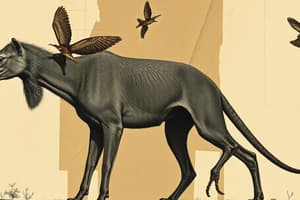Podcast
Questions and Answers
What is the primary focus of ethology within zoology?
What is the primary focus of ethology within zoology?
- The study of animal behavior (correct)
- The study of insects (correct)
- The study of mammals (correct)
- The study of animal evolution (correct)
Which branch of zoology is primarily concerned with reptiles and amphibians?
Which branch of zoology is primarily concerned with reptiles and amphibians?
- Ichthyology
- Herpetology (correct)
- Mammalogy
- Entomology
What does comparative anatomy study?
What does comparative anatomy study?
- The similarities and differences in animal structures (correct)
- The evolution of animal species
- The taxonomy of various animals
- The behavioral patterns of animals
Which of the following best describes the focus of conservation biology?
Which of the following best describes the focus of conservation biology?
Who is known for their work on the theory of evolution by natural selection?
Who is known for their work on the theory of evolution by natural selection?
What is the study of animal interactions with their environment called?
What is the study of animal interactions with their environment called?
Which technique is not typically used in zoological research?
Which technique is not typically used in zoological research?
What challenge in zoology is primarily caused by urbanization?
What challenge in zoology is primarily caused by urbanization?
Flashcards are hidden until you start studying
Study Notes
Definition
- Zoology is the scientific study of animals and their behavior, structure, physiology, classification, and distribution.
Branches of Zoology
- Entomology: Study of insects.
- Ornithology: Study of birds.
- Mammalogy: Study of mammals.
- Herpetology: Study of reptiles and amphibians.
- Ichthyology: Study of fish.
- Ethology: Study of animal behavior.
- Evolutionary Zoology: Study of animal evolution and phylogeny.
- Comparative Anatomy: Study of similarities and differences in animal structures.
- Ecology: Study of animal interactions with their environment.
Key Concepts
- Taxonomy: Classification of animals into hierarchical categories (Kingdom, Phylum, Class, Order, Family, Genus, Species).
- Anatomy: Study of the physical structure of animals.
- Physiology: Study of how animal bodies function.
- Developmental Biology: Study of the processes by which animals develop from zygotes to mature forms.
- Behavioral Ecology: Study of the ecological and evolutionary basis of animal behavior.
Important Topics
- Animal Evolution: Understanding how species evolve over time through natural selection and adaptation.
- Biodiversity: Study of the variety of animal life in different ecosystems.
- Conservation Biology: Focus on protecting species and their habitats.
- Animal Physiology: Examines the functions of different animal systems (e.g., respiratory, circulatory, nervous).
Research Techniques
- Field Studies: Observing animals in their natural habitats.
- Laboratory Experiments: Controlled studies to understand specific physiological or behavioral traits.
- Genetic Analysis: Studying the genetic makeup of animals to understand heredity and evolution.
Applications of Zoology
- Conservation Efforts: Protecting endangered species and restoring habitats.
- Agriculture: Improving livestock management and pest control.
- Biomedical Research: Studying animal models to advance human medicine.
Important Figures in Zoology
- Charles Darwin: Developed the theory of evolution by natural selection.
- Jean-Baptiste Lamarck: Proposed early ideas about evolution and adaptation.
- Konrad Lorenz: Known for research in animal behavior and imprinting.
Challenges in Zoology
- Habitat loss due to urbanization and agriculture.
- Climate change affecting animal populations and migration.
- Pollution and its impact on biodiversity.
- Invasive species disrupting local ecosystems.
Current Trends
- Use of technology in wildlife tracking and research.
- Focus on genetic conservation and biodiversity preservation.
- Increased interest in animal welfare and ethical treatment.
Conclusion
- Zoology is a vital field that contributes to our understanding of animal life, informs conservation efforts, and enhances our appreciation of biodiversity on Earth.
Definition
- Zoology encompasses the scientific study of animals, including their structure, behavior, physiology, classification, and distribution.
Branches of Zoology
- Entomology: Focus on insects, examining their diversity and roles in ecosystems.
- Ornithology: Study of birds, their behavior, ecology, and biology.
- Mammalogy: Investigates mammals, covering a wide range from their evolution to conservation.
- Herpetology: Examines reptiles and amphibians, focusing on their unique adaptations.
- Ichthyology: Researches fish, their physiology, taxonomy, and habitats.
- Ethology: Focus on animal behavior, emphasizing natural behaviors in various environments.
- Evolutionary Zoology: Studies the evolution and phylogeny of animals.
- Comparative Anatomy: Analyzes similarities and differences in anatomy across species.
- Ecology: Explores interactions between animals and their environments.
Key Concepts
- Taxonomy: The hierarchical classification system for organizing animal species into categories (e.g., Kingdom, Phylum).
- Anatomy: Investigates the physical structures of animals.
- Physiology: Studies the functioning of animal systems and processes.
- Developmental Biology: Examines the stages of animal development from zygote to maturity.
- Behavioral Ecology: Integrates ecological and evolutionary perspectives on animal behavior.
Important Topics
- Animal Evolution: Insights into species development through natural selection and environmental adaptation.
- Biodiversity: Exploration of diverse animal life across ecosystems and its significance.
- Conservation Biology: Emphasizes protecting species and their natural habitats to prevent extinction.
- Animal Physiology: Focuses on various physiological systems, including respiratory and nervous systems.
Research Techniques
- Field Studies: Involves observing animals in their natural settings to gather data on behavior and ecology.
- Laboratory Experiments: Conducts controlled experiments to investigate specific physiological or behavioral traits.
- Genetic Analysis: Studies genetic variations and how these relate to evolution and heredity patterns in animals.
Applications of Zoology
- Conservation Efforts: Engages in protecting endangered species and restoring their habitats.
- Agriculture: Enhances livestock management practices and develops effective pest control strategies.
- Biomedical Research: Uses animal models to facilitate advancements in human health and medicine.
Important Figures in Zoology
- Charles Darwin: Formulated the theory of evolution through natural selection, impacting biological sciences profoundly.
- Jean-Baptiste Lamarck: Introduced early concepts of evolution, including ideas about adaptation.
- Konrad Lorenz: Renowned for pioneering research in animal behavior, particularly imprinting.
Challenges in Zoology
- Habitat loss stemming from urban development and agricultural practices threatens biodiversity.
- Climate change influences animal populations, their behaviors, and migratory patterns.
- Pollution poses significant threats to various species and ecosystems.
- Invasive species disrupt native ecosystems, causing ecological imbalances.
Current Trends
- Incorporation of technology for wildlife monitoring and research advancements.
- Growing emphasis on genetic conservation efforts to sustain biodiversity.
- Increasing awareness and advocacy for animal welfare and ethical treatment.
Conclusion
- Zoology plays a crucial role in enhancing our knowledge of animal life, informing conservation strategies, and fostering appreciation for Earth's biodiversity.
Studying That Suits You
Use AI to generate personalized quizzes and flashcards to suit your learning preferences.




